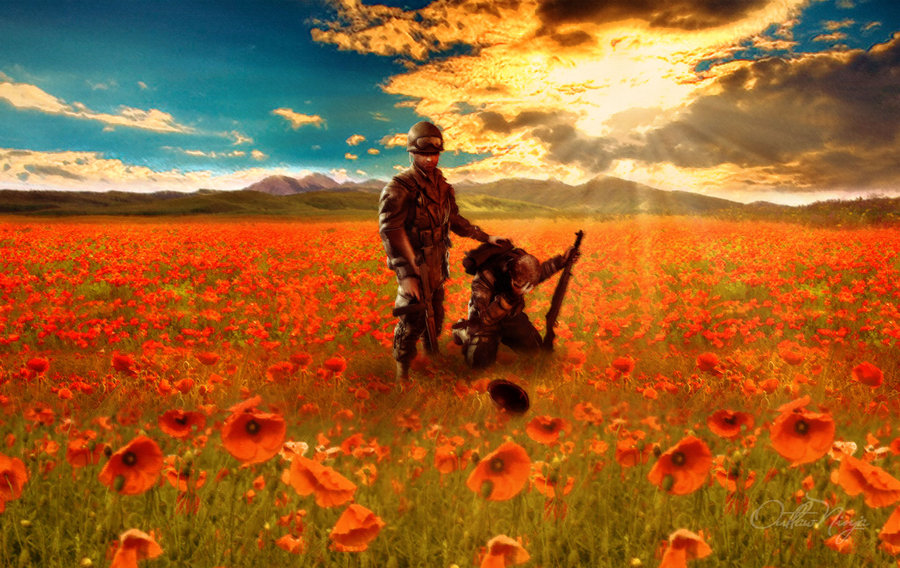

In 1921, poppies were sold in the UK for the first time by the British Legion raising an impressive £106,000 (that's the equivalent of nearly £3 million today!) and the following year Major George Howson formed the Disabled Society and encouraged disabled ex-servicemen and women from the First World War to make poppies at the new Poppy Factory. Guérin started manufacturing the artificial poppies we see today. In 1920, the National American Legion adopted poppies as their official symbol of remembrance and Frenchwoman Anna E. She then started selling poppies to raise money for the ex-service community. Later, in 1918, an American poet called Moira Michael, wrote 'We Shall Keep the Faith' and urged people to wear a poppy 'in honour of the dead'. The poem was published and the poppy became an official symbol of hope and remembrance. In 1915 John McCrae, a Canadian doctor serving in the war, wrote the poem 'In Flanders Fields' all about the poppy and the war. The flowers are also symbols of peace and death because of their blood-red colour. Poppies were the first wildflower to bloom and grow amongst the chaos and destruction of the battlefields of World War One, with its bright red petals offering a reminder of those who had given their lives for the cause. They are worn as a sign of support for the Armed Forces and all that they do for the country. When they were introduced on 11th November 1921, they sold out, raising £106,000 (about £5 million in today’s money) to help those left injured or bereaved by the war.Poppies symbolise remembrance and hope. Her cause was helped by Anna Guérin, who persuaded the founder of the British Legion, the former Field Marshal Douglas Haig, now Earl Haig, to adopt the poppy as an emblem of British remembrance. The poem inspired American academic, Moina Michael, to campaign for the poppy to become an official symbol of remembrance across the United States, Canada, Australia, and the UK. Poppies were inspired by a Canadian poet and an American academic.Ĭanadian doctor, Lieutenant Colonel John McCrae, first saw poppies in Flanders in 1915 and the sight inspired him to write 'In Flanders Fields', before the effects of war claimed his life three years later. On 15th May 1921, The Royal British Legion was formed to raise money for those affected by WWI by the simple act of buying and wearing a poppy. The soil, fertile from the dead, was the perfect environment for the flower, its sheer existence, announced by its bloodred countenance, made it a fitting tribute to those who had died. Shortly after the end of the First World War, the former battlegrounds in France, now acting as silent witnesses to the events that had unfolded, played host to vast blankets of bright red poppies. Why do people wear poppies to acknowledge Remembrance Day? Read more about: WW1 The history of Anzac Day: Australia and New Zealand's day of remembrance On 1st July 1916, during the Battle of the Somme, the British Army alone lost 57,470 personnel in a single day. In total, there were 17 million deaths and 21 million wounded on both sides, a figure that significantly dwarfed those of previous wars in Europe.

The young men, from all walks of life, that followed Field Marshal Douglas Haig into battle were completely unprepared for the sheer intensity, and horror, of what lay before them. It was the first war that was truly mechanised to maximise damage as it was the first time the battlefield had seen light-machine guns, the use of aircraft in combat, tanks (or ‘landships’ as they were then known) and lethal chemicals. It’s almost impossible to comprehend the catastrophic loss of life that defined World War I. But what is the story behind the nation collectively gathering around the Cenotaph, or the wearing of poppies, and is there a difference between Remembrance Day and Remembrance Sunday? Remembrance Day: Friday, 11th November 2022 - honours the dead from the First World War. Every November, the United Kingdom remembers the thousands of individuals who have died in conflict.


 0 kommentar(er)
0 kommentar(er)
